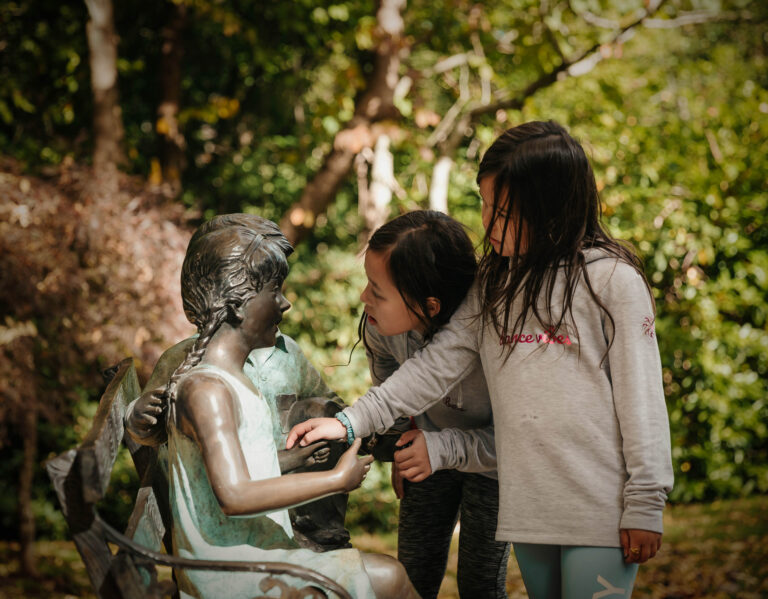As adults, we wake each morning to the thought of another long and busy day. We may dread what lies ahead and hope we can get through it without major hiccups. This is in contrast to our childhood when each new day dawned full of infinite possibilities. For younger children, each morning can be likened to a gift on Christmas morning, waiting to be unwrapped and explored. No wonder the childhood character, Peter Pan, never wanted to grow up. Taking the example of a child, maybe we need to move away from merely surviving the day and look forward to a day full of wonder and discovery.
At some point, we all have to grow into a world of responsibility that is adulthood. Many ideas we associate with being ‘childish’ become considered negative traits. We may find ourselves reminiscing about days when the most important decision was what time to be home for dinner. Peter Pan’s infamous words, “I don’t want to grow up, it’s a trap,” may have been onto something.
As adults, we jump into the role of parenting with the belief that our main task is to impart our knowledge and wisdom with the hope that our children will grow into respectable and well-educated adults. That’s the ultimate goal, and we, as adults, are best equipped to shape and mould their young minds. But over the past few days, my eight-year-old daughter has opened my eyes to a new reality.
Wisdom of an eight-year-old
As we travelled down the highway, taking in the magical Christmas lights, my daughter shared a simple yet profound truth. “The best part of Christmas is being with my family,” she said, with clarity and wisdom beyond her years. She explained that she loves being with her favourite people during the holiday. Witnessing such heart-warming statements from a child, I began to reflect on other pearls of wisdom I’ve heard from this daughter lately.
I’ve also been struck by her deep sense of compassion for others. We have an ongoing conversation about people with a particular illness and what happens if they can’t afford the medication they need. I try to assure her the doctors will find a way to ensure such people get the medicine they need. Still not satisfied, her steadfast will to do good for others takes over and she sets about creating projects to raise funds to assist. Even if the funds don’t eventuate, the gesture alone is beautiful.
What can I learn from a child?
Life experiences, whether positive or negative, shape and form the basis of who we are. Even when we have a wealth of experiences, we can be enriched by making time to appreciate our children’s spontaneity, connectedness, and ability to express their emotions without hesitation.
On the other hand, children have yet to learn the life lessons that come with adulthood. We can learn from their spontaneity, connectedness, and ability to express emotions without a second thought. Children can also teach us the importance of making and embracing mistakes, trying new and sometimes scary things, dreaming big, and having fun. As Peter Pan said, “Once you’re grown up, you can’t come back.” It’s a valuable lesson for those of us who may be tempted to rush growing up or have no choice in the matter. We should all strive to maintain a sense of childlike wonder and cherish the joy and innocence that comes with it.
Five stand-out lessons to learn
- Do what makes you happy
Children know exactly what they want and aren’t afraid to express their desires. Think back to your childhood and feeling hungry for a snack, for example. Nutritional content probably didn’t enter your mind because you were more concerned about enjoying the food. When I observe my girls as they rummage through the pantry for a snack, I see them confidently picking out precisely what they want.
Children have a clear idea of what makes them happy. As adults, we can remember the snacks we enjoyed and the activities that made us content, but we can also use this knowledge to understand and support our children.
My eldest daughter is a performer and loves to belt out a tune – she’s passionate about performing arts and dreams of becoming a performer. It’s important to remember how we felt as children – when we were confident enough to know what we enjoyed without worrying about what was good or bad. That’s why it’s essential to encourage our children to follow their dreams and passions – no matter how messy it might get.
- Tap into your creative side– Creativity can often seem out of reach for adults. We may be too rational, too focused on the practical, and too used to relying on existing solutions. But it doesn’t have to stay that way! Take a leaf out of the book of children – they are experts at imagining something out of nothing and transforming items into whatever they want. Don’t let your rational mind dominate all the time – take a step back, channel your inner child, and unlock a new level of creativity.
- Find the beauty in the little things- Adults often overlook simple joys while children possess an innate curiosity and fascination for the world around them. From jumping in puddles to examining bugs, admiring rainbows, or blowing bubbles, these everyday moments are a source of delight. By savouring these simple pleasures, we can better equip ourselves to deal with the more difficult times that come and go. The next time you have a chance to join a child in their exploration of the natural world, take it! You might discover an appreciation for little wonders that you never knew you had.
- Show the world your feelings- Children have a remarkable capacity to show emotion without holding back. They may become overwhelmed with various feelings within moments. A child’s face is a storyteller, conveying a range of emotions from joy to sadness. Adults, however, are more complex. We often try to control and conceal our emotions instead of feeling and expressing them. Unfortunately, this behaviour can lead us to develop unhealthy coping mechanisms.
Take a cue from the younger generation: express your genuine emotions and experience the freedom that comes with it.
- Live life fearlessly
It’s easy to become comfortable in our routines and succumb to fear, especially as we get older. But imagine tapping into your younger days when the excitement of achieving a goal was more significant than the risk of failure. What if you could acknowledge your fears, assess the actual risks, and move forward with the confidence of a child learning something new? Take a leap of faith and embrace the opportunities that await you. Don’t let fear hold you back – take a chance and discover what could be.
Adults can forget the freedom and resilience of childhood. Children don’t fear falling because they believe they can get back up. They jump, climb, and enthusiastically explore the world around them. This is a reminder that no matter our age, we can take risks, face challenges, and get back up when life knocks us down.
By tuning into our children, we can discover a new approach to managing our life. Often, the simplest words hold the most profound meaning.
- Maybe you’ve had a similar or vastly different experience. Comment or send me an email about your experiences.


2 Comments
Well done as always Sam, look forward here to the simple joys of the grandchildren they are my highlight for any occasion. Have a wonderful Christmas am very tired, hoping to get some sleep. Neville is now at home from an operation and has another early Jan, has not been a great week. Looking forward to where you go in 2023 and all the very best Julie xx
Hi Julie,
Apologies for the late response. The end-of-year, Christmas and New Year period has been particularly hectic. I’m glad it’s over! As always, thanks for your feedback. I hope Neville is recovering from his surgery and you’ve managed to catch up on some sleep. Wishing you all the best for 2023. Let’s hope it’s a positive one with lots of good stuff in store.